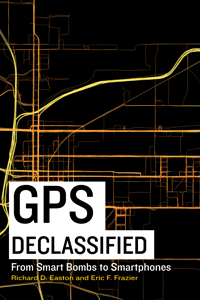From Smart Bombs to Smartphones
By Richard D. Easton and Eric F. Frazier
Potomac Books, an imprint of University of Nebraska Press
320 pages, 30 illustrations, index
Foreword by Rick W. Sturdevant, PhD, Deputy Director of History, HQ Air Force Space Command
October 2013 Clothbound 978-1-61234-408-9 $39.95
October 2013 E-Book (PDF) 978-1-61234-409-6 $29.95
January 2018 Audiobook ASIN B078RVZ4CY Audible subscription
May 2020 Paperback 978-1-64012-307-6 $29.95
GPS Declassified examines the development of GPS from its secret, Cold War military roots to its emergence as a worldwide consumer industry. Drawing on previously unexplored documents, the authors examine how military rivalries influenced the creation of GPS and shaped public perceptions about its origin. Since the United States’ first program to launch a satellite in the late 1950s, the nation has pursued dual paths into space—one military and secret, the other scientific and public. Among the many commercial spinoffs this approach has produced, GPS arguably boasts the greatest impact on our daily lives.
Told by the son of a navy insider—whose work helped lay the foundations for the system—and a science and technology journalist, the story chronicles the research and technological advances required for the development of GPS. The authors peek behind the scenes at pivotal events in GPS history. They note how the technology moved from the laboratory to the battlefield to the dashboard and the smartphone, and they raise the specter of how this technology and its surrounding industry affect public policy. Insights into how the system works and how it fits into a long history of advances in navigation tie into discussions of myriad applications for GPS.
Praise for GPS Declassified
“Here, at last, Richard Easton and Eric Frazier present in plain, simple language how a positioning, navigation and timing system originally developed for military purposes―one that Air Force Space Command continues to operate and maintain―became essential for countless civil and commercial activities around the world. The authors deftly place the concept and development of GPS within two broader historical contexts: navigation and robotic spaceflight.”
— from the foreword by Rick W. Sturdevant, PhD, Deputy Director of History, Air Force Space Command
“A fine and entertaining story of the origins of the Global Positioning System, a consequential space-age technology that has affected the lives of hundreds of millions in war and peace. Non-specialist readers will easily understand principles of this sophisticated system and appreciate difficulties of GPS development by visionary individuals.”
—Mike Gruntman, PhD, professor of astronautics at the University of Southern California at Los Angeles and author of Blazing The Trail: The Early History Of Spacecraft And Rocketry
“The authors do the impossible, making an intricate technological advance fascinating to read. They offer an informative and well-researched account of how GPS proved its worth even before the system was complete. The results it provided in the Persian Gulf War were truly revolutionary. With this seemingly miraculous kick-off, GPS technology was almost immediately integrated throughout military systems. Entrepreneurs immediately picked up on this, and made it equally successful in commerce.”
—Walter J. Boyne, author of How the Helicopter Changed Modern Warfare and former director of the National Air and Space Museum of the Smithsonian Institution


